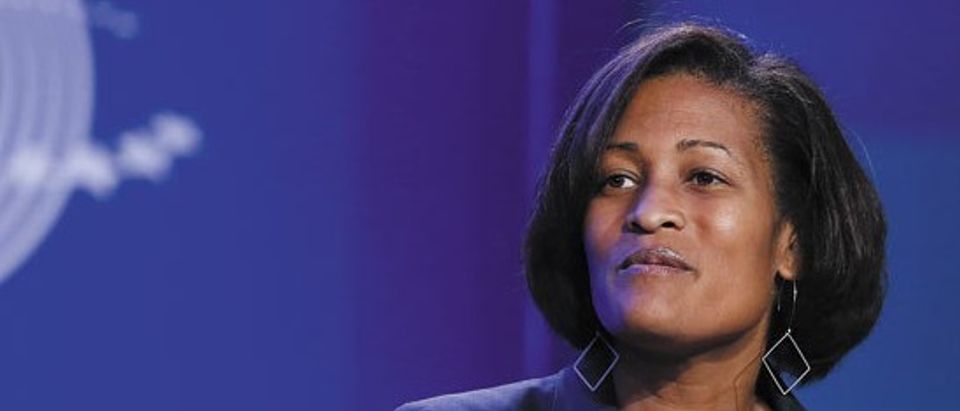One theme shines through the transcript from Judicial Watch’s deposition last week of Cheryl Mills: the former Hillary Clinton chief of staff did not want her to answer questions about what she knew about the creation of the former secretary of state’s private email system and of Bryan Pagliano, the IT staffer who managed the setup.
The Daily Caller counted 15 separate lines of questioning in which Mills’ lawyer, Beth Wilkinson (the wife of former “Meet the Press” host David Gregory) instructed her client not to answer questions posed by Judicial Watch’s lawyers during Friday’s deposition.
Most of the don’t-answer orders involved questions about Mills’ knowledge of how Pagliano, a former State Department information technology specialist, set up Clinton’s private email system.
Wilkinson also instructed her client not to provide answers to questions about a finding laid out in a State Department inspector general’s report from January which showed that she blocked a Freedom of Information Act (FOIA) request for information about Clinton’s email accounts from being processed.
The deposition is the second that Judicial Watch has conducted since U.S. District Court Judge Emmet Sullivan ordered discovery in the watchdog’s lawsuit against the State Department. Sullivan, a Bill Clinton appointee, limited discovery to the creation of Clinton’s private email system and to the State Department’s handling of FOIA requests.
Judicial Watch had sued for records related to the employment of Clinton’s deputy chief of staff, Huma Abedin. The State Department initially denied the request, saying no records were found. But the lawsuit was resumed last year after it was revealed that Clinton exclusively used a personal email account.
The transcript of the five-hour deposition suggests a contentious battle between Judicial Watch’s lawyers and those representing Mills and the Obama administration.
Much of the acrimony centered on when Mills learned about the creation of Clinton’s private email system and Pagliano’s role in managing it.
“What did Mr. Pagliano tell you in those conversations you had about the setup of the server?” Ramona Cotca, Judicial Watch’s lawyer, asked at one point.
“Objection. Beyond the scope. And I’m going to instruct her not to answer,” Wilkinson jumped in.
Cotca followed up with a question about Justin Cooper, a Bill Clinton aide who registered the clintonemail.com domain that Hillary Clinton used.
“When did you speak with Justin Cooper about the setup of the server?” the lawyer asked.
“It would have been in the course of the representation of Secretary Clinton that I would have spoken to him about the setup of her server,” Mills responded.
“Did you ever represent Mr. Pagliano or Justin Cooper?” Cotca asked later.
“Don’t answer,” Wilkinson instructed.
Wilkinson later explained that Mills did not have to provide information about Clinton’s email system that she learned as the presidential candidate’s attorney.
“You are asking her questions about work she did after she left the department, on behalf of Secretary Clinton, as her lawyer, preparing her client in an investigation and in turning over documents to the State Department,” Wilkinson said, according to the transcript.
Mills began worked as an attorney for Clinton after the former first lady left the State Department in Feb. 2013. Any information she learned about Clinton or the email server after that point is protected by attorney-client privilege, Wilkinson said.
“You asked her how she learned the information after she left the department. She told you she had no knowledge of how the Clinton noncomm account was set up in 2009, when it was. And that’s what is relevant in the scope here, not what she learned after the fact as a lawyer. And that’s why I’m instructing her not to answer.”
If Mills had learned about the creation of the system while she worked for Clinton, her knowledge would be open to discovery.
Mills certainly had some knowledge about Clinton’s personal email system when she worked at the State Department. The two exchanged emails frequently. Mills also appears to have known that Clinton had a private server. She is included on an Aug. 30, 2011 email chain in which the device is mentioned. (RELATED: Clinton Aides Resisted Suggestion That Hillary Use State.gov Email Account)
Wilkinson also instructed Mills not to answer questions about her handling of a Dec. 2012 FOIA request filed by the watchdog group Citizens for Responsibility and Ethics in Washington (CREW). (RELATED: IG: State Dept. Gave ‘Inaccurate’ Response To Records Request For Hillary’s Email Account)
According to an inspector general’s report released in January, Mills was notified about the FOIA request, which sought records related to Clinton’s email account. But Mills seemingly did tell the FOIA office about Clinton’s personal email address. The State Department denied the request in May 2013. The IG called the agency’s response “incomplete and inaccurate.”
The Daily Caller reportedly extensively on that FOIA request and the false denial. CREW, which came under the control of Clinton ally David Brock in 2014, did not pursue the issue.
Mills’ refusal to answer numerous Judicial Watch questions comes in the wake of a report that she left in middle of an interview she had with the FBI earlier this month. The bureau if investigating the potential mishandling of classified information on Clinton’s server.
When questions turned to Mills’ work in determining which emails Clinton turned over to the State Department in December 2014, she and Wilkinson left the FBI interview, The Washington Post reported.
As with last Friday’s deposition, Mills and her counsel considered the questions off-limits because she was working as Clinton’s lawyer when the emails were being reviewed.


